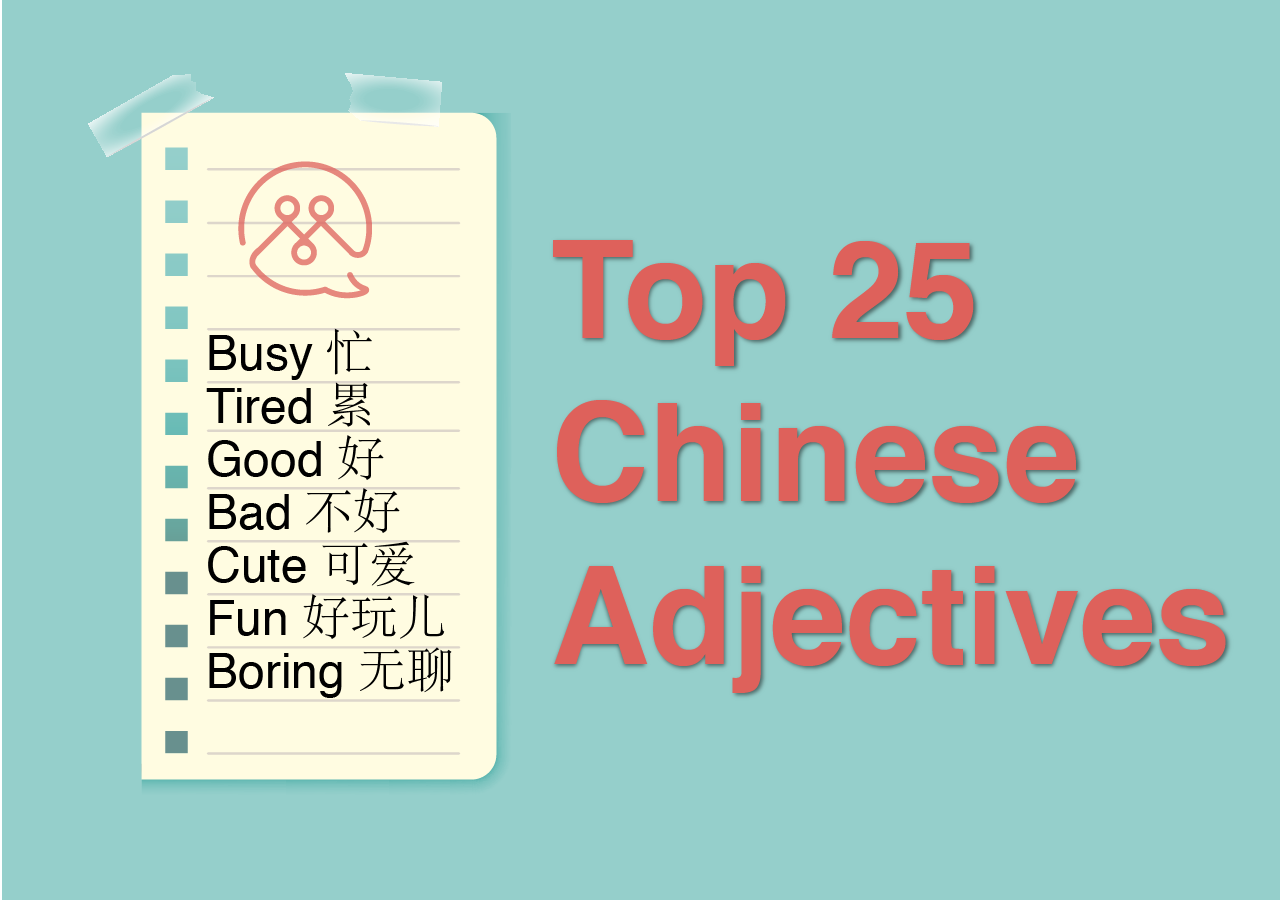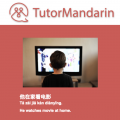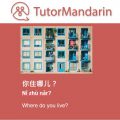Top 25 Chinese Adjectives
There are lots of Chinese adjectives that you can easily learn. Plus, Chinese adjectives sometimes from those in English in that they can be also used as verbs. Learning adjectives is one of the most important parts of studying any language. No worries! It’s just like English and not very difficult to learn.
Today, we’ve chosen the top 25 Chinese adjectives with the example sentences that are a good path to begin your Chinese. They’re commonly used and super easy to learn and write. So let’s take a look.
1. 忙 (máng)

“忙” is one of the Chinese adjectives and can be used to describe “busy.”
Examples:
你忙吗?(Nǐ máng ma?)
Are you busy?
我很忙。(Wǒ hěn máng.)
I am so busy.
2. 累 (lèi)

The Chinese adjective word “累” is used when you’re tired and in need of sleep or rest.
Examples:
你累吗?(Nǐ lèi ma?)
Are you tired?
我不太累。(Wǒ bù tài lèi.)
I am not too tired.
3. 好 (hǎo)

The word “好” literally means “good/fine” and most common word in Chinese.
Examples:
你好吗?(Nǐ hǎo ma?)
How are you?
我很好。 (Wǒ hěn hǎo.)
I am pretty good.
4. 好看 (hǎokàn)

“好看” means “good-looking” and you can be also used as someone’s physical attractiveness.
Examples:
我的房子很好看。(Wǒ de fángzi hěn hǎokàn.)
My house is good-looking.
他很好看。 (Tā hěn hǎokàn.)
He is good-looking.
5. 漂亮 (piàoliàng)

“漂亮” means “beautiful/elegant/pretty.”
Examples:
你姐姐很漂亮。(Nǐ jiějie hěn piàoliàng.)
Your older sister is really beautiful.
他有很多漂亮的照片。(Tā yǒu hěnduō piàoliàng de zhàopiàn.)
She has many beautiful pictures
6. 多 (duō)

The meaning of “多” is “many/more.” It can be always used with nouns.
Examples:
我有很多书。(Wǒ yǒu hěn duō shū.)
I have many books.
我没有很多照片。(Wǒ méiyǒu hěn duō zhàopiàn.)
I don’t have many pictures.
7. 可爱 (kěài)

It means “cute/lovely” and can be described as the characteristics of positive emotions and reflected in young or newborn, tender creatures or childlike things.
Examples:
他很可爱。 (Tā hěn kěài.)
She is cute.
他的狗很可爱。(Tā de gǒu hěn kěài.)
His dog is really cute.
8. 好吃 (hǎochī)

The meaning is “tasty/delicious” and that can be used as highly pleasant to the taste.
Examples:
我妈妈做的饭很好吃。( Wǒ māma zuò de fàn hěn hǎochī.)
The dish made from my mother is tasty.
中国菜很好吃。(Zhōngguó cài hěn hǎochī.)
Chinese food is tasty.
9. 少 (shǎo)
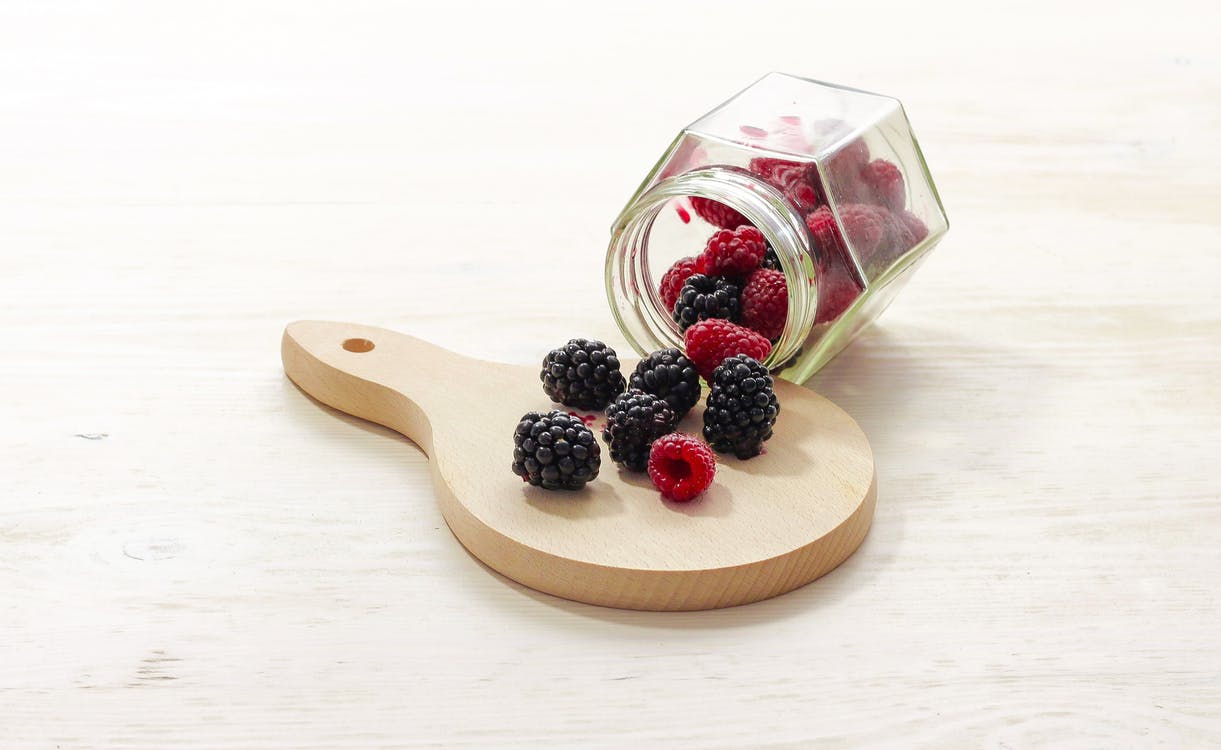
“少” means “few/a small number of”
Examples:
我们家书很少。(Wǒmen jiā shū hěn shǎo.)
We have very few books at home.
我们的照片很少。(Wǒmen de zhàopiàn hěn shǎo.)
We have very few photos.
10. 好玩儿 (hǎowán’er)

It means “interesting/fun/enjoyable.
Examples:
打篮球很好玩儿。(Dǎ lánqiú hěn hǎowánr.)
It’s fun to play basketball.
这个电脑游戏很好玩儿。(Zhège diànnǎo yóuxì hěn hǎowánr.)
This computer game is fun.
11. 无聊 (wúliáo)

“无聊” means “boring/bored” and it can also be described as a mental state of humanity.
Examples:
他觉得出门太麻烦了,也觉得很无聊。(Tā juéde chūmén tài máfán le, yě juéde hěn wúliáo.)
He thinks going out is too troublesome and boring.
我觉得看电影很无聊,我喜欢看书。(Wǒ juéde kàn diànyǐng hěn wúliáo, wǒ xǐhuan kàn shū.)
I think watching movies is boring, I like to read books.
12. 有意思 (yǒuyìsi)

You can use this adjective word “有意思” when you have some interesting and fun things.
Examples:
我觉得出门很有意思! 我喜欢出门去运动。(Wǒ juéde chūmén hěn yǒuyìsi! Wǒ xǐhuan chūmén qù yùndòng.)
I think going out is fun! I like to go out to exercise.
我觉得学汉语很有意思。(Wǒ juédé xué hànyǔ hěn yǒuyìsi.)
I think it’s interesting to learn Chinese.
13. 快 (kuài)

“快” means “fast/quick” and can use when you have to do something at high speed.
Examples:
他走得很快。(Tā zǒu de hěn kuài.)
He walks fast.
我写汉字, 写得不快。(Wǒ xiě hànzì, xiě de bú kuài.)
I write Chinese words at a slow speed.
14. 难 (nán)

You can use “难” when the things are difficult to solve. It literally means “difficult/hard.”
Examples:
写汉字很难,说汉语也很难! (Xiě hànzì hěn nán, shuō hànyǔ yě hěn nán.)
Writing Chinese is difficult, speaking Chinese is also difficult.
我不会做饭,我觉得很难。(Wǒ bú huì zuò fàn, wǒ juéde hěn nán.)
I don’t know how to cook, I think it is difficult.
15. 新 (xīn)

The definition of “新” is “new.”
Examples:
这是一支新手机. (Zhè shì yìzhī xīn shǒujī.)
This is a new cell phone.
这是我的新车。(Zhè shì wǒ de xīnchē.)
This is my new car.
16. 旧 (jiù)

The word “旧” means “old/used/worn.”
Examples:
我有一支旧手机。(Wǒ yǒu yìzhī jiù shǒujī.)
I have an old cell phone.
我的旧手机坏了!(Wǒ de jiù shǒujī huài le!)
My old cell phone is broken!
17. 大 (dà)
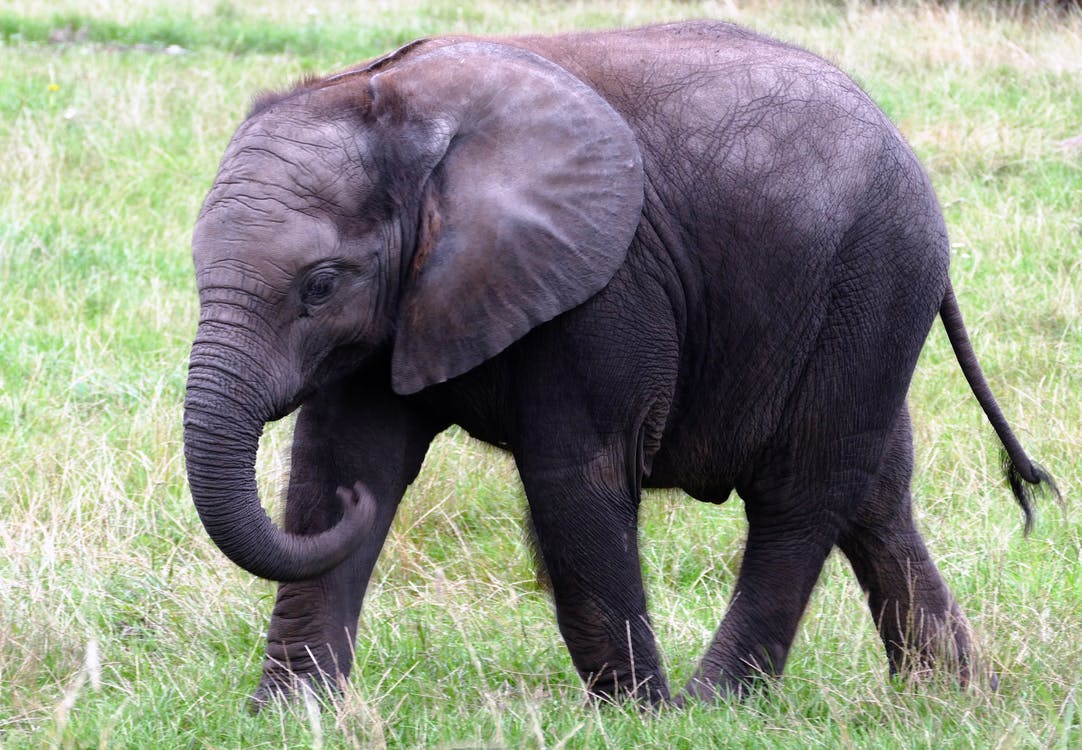
“大” means “big” and can be used commonly with nouns.
Examples:
这支手机有一点大, 我不喜欢。(Zhè zhī shǒujī yǒu yìdiǎn dà, wǒ bù xǐhuan.)
This phone is a bit big, I don’t like it.
我家很大。(Wǒjiā hěn dà.)
My house is big.
18. 远 (yuǎn)

The adjective “远” means “far.”
Examples:
图书馆离邮局很远。(Túshūguǎn lí yóujú hěn yuǎn.)
The library is far away from the post office.
我的家不远,图书馆往左拐就到了。(Wǒ de jiā bù yuǎn, túshūguǎn wǎng zuǒ guǎi jiù dào le.)
My home is not far, turn left after the library and you’ll arrive.
19. 近 (jìn)

The meaning of “近” is “near/close.” 远 and 近 can always be used for distance.
Examples:
图书馆离我家很近! (Túshūguǎn lí wǒ jiā hěn jìn.)
The library is close to my house.
你家离电影院近吗?(Nǐ jiā lí diànyǐngyuàn jìn ma?)
Is your house close to the movie theater?
20. 方便 (fāngbiàn)

“方便” means “convenient.”
Examples:
我家旁边有一些餐厅,也有超市和图书馆 , 住在那里很方便。(Wǒ jiā pángbiān yǒu yìxiē cāntīng, yě yǒu chāoshì hé túshūguǎn. Zhù zài nàlǐ hěn fāngbiàn.)
There are some restaurants, supermarkets, and libraries near my house. Living there is very convenient.
我的公司附近很方便,饭馆、咖啡店和超市都有。(Wǒ de gōngsī fùjìn hěn fāngbiàn. Fànguǎn, kāfēi diàn hé chāoshì dōu yǒu.)
The facilities near my company are very convenient. We have restaurants, coffee shops, and supermarkets.
21. 便宜 (cheap)

You can say “便宜” when you buy the thing which is a fair price.
Examples:
汽车在中国很便宜。(Qìchē zài Zhōngguó hěn piányi.)
Cars are cheap in China.
在中国去饭馆吃饭很便宜。(Zài Zhōngguó qù fànguǎn chīfàn hěn piányi.)
It’s cheap to go to eat at the restaurant in China.
22. 慢 (màn)

“慢” means “slow.”
Examples:
他说中文,说得很慢。(Tā shuō zhōngwén,shuō de hěn màn.)
He speaks Chinese slowly.
你为什么那么慢?(Nǐ wèishénme nàme màn?)
Why are you so slow?
23. 快乐 (kuàile)

It means “happy” and you can also use when you want to wish for someone.
Examples:
旅游是一件很快乐的事情。(Lǚyóu shì yí jiàn hěn kuàilè de shìqing.)
Traveling is a very happy thing.
生日快乐! 这是给你的礼物。(Shēngrì kuàilè! Zhè shì gěi nǐ de lǐwù.)
Happy Birthday! This present is for you.
24. 有名 (yǒumíng)

“有名” means “famous.”
Examples:
这是这儿最有名的饭馆。(Zhè shì zhèr zuì yǒumíng de fànguǎn.)
This is the most famous restaurant here.
我家附近的海边很有名,放假的时候常常很多人来玩儿。(Wǒ jiā fùjìn de hǎibiān hěn yǒumíng, fàngjià de shíhou cháng cháng hěn duō rén lái wánr.)
The beach nearby my house is really famous, during the holidays there are frequently lots of people.
25. 长 (cháng)

The adjective “长” means “long.”
Examples:
那条路不长。(Nà tiáo lù bù cháng.)
That road is not long.
他学中文的时间很长。(Tā xué Zhōngwén de shíjiān hěn cháng.)
He studied Chinese for a long time.
These are some of the most common Chinese adjectives characters that are recommended for beginners looking to learn Mandarin. Make sure to follow up the trend and blend into conversations as you to learn Chinese language! Chinese language learning can be a long journey, start your journey right now by signing up for a free trial class to learn Mandarin online and read more of our blog about the Chinese language.

